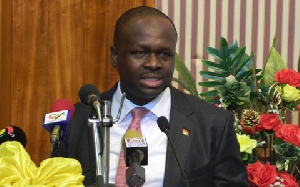- Home - News
- TWI News | TV
- Polls
- Year In Review
- News Archive
- Crime & Punishment
- Politics
- Regional
- Editorial
- Health
- Ghanaians Abroad
- Tabloid
- Africa
- Religion
- Election 2020
- Coronavirus
- News Videos | TV
- Photo Archives
- News Headlines
- Press Release
Business News of Tuesday, 2 September 2014
Source: GNA
Minister commends Police and Anti-Fraud Task Force
Dr Edward Kofi Omane Boamah, Minister of Communications, has commended the Police and the Anti-Fraud Task Force for the arrest of SIMBOX fraudsters at a location near Dome Pillar Two, Accra on Tuesday, August 26.
He said the actions of the SIMBOX fraudsters had led to the nation losing over $ 800,000, saying that, “so far we are told, over $ 50 million has been lost through the actions of SIMBOX fraudsters."
Dr. Boamah made the commendation on Monday at a Joint Press Conference held in Accra by the Ministry and the Criminal Investigations Department of the Ghana Police Service on the arrest of the SIMBOX fraudsters.
“I also noted that this is as a result of the vigilance on the part of the security agencies to protect the integrity of the nation’s communications industry and with it, protect the revenue that is lost through the activities of the fraudsters.
“As you would recall, Government in 2009 passed the Electronic Communications (Amendment) Act, Act 786 to provide a minimum rate of international incoming electronic communication traffic and for related matters.”
The Minister said the minimum rate was established to support the stability and profitability of the Ghana market and also to protect the operating service providers from folding up their operations and laying off Ghanaian workers.
He said the action was therefore, to compel international telephone traffic to pass through the existing licensed international gateways and pay appropriate termination rates to the telecom operators, stating that, this would in effect increase the volumes of traffic and also improve revenue earnings for the companies.
Dr Boamah said the technology exists for alternative (illegitimate, criminal and fraudulent) routes to be employed to bring international telephone traffic into the country without passing through the registered International Gateways.
He said because these are not official and unregistered; they do not pay relevant fees and taxes, adding that, they also divert revenue from the Telcos to their private accounts and those of their collaborators both inside and outside the country.
He said the illegal by-pass is done by illegal Operators, who use a device called SIMBOX, which could accommodate from 4 to 50,000 SIM cards.
Dr Boamah explained that the SIMBOX converts international calls it receives through the internet to convert and present these as local calls to the receiving public.
He noted that the availability of high-speed internet, as well as unregistered SIM cards, facilitates the business of SIMBOX fraudsters.
He said through the activities of the illegal Operators, the international telephone traffic that reached nearly 100 million minutes per month with the introduction of International Gateway Monitoring framework by the National Communications Authority, has plummeted to less than 60 million minutes per month.
Dr Boamah observed that “if we consider that six cents is contributed on every call per minute to the Consolidated Account of Government to be used for national development then we can do our own calculations of what is lost through the activities of the fraudsters at the end of every month."
He further lauded all the patriotic citizens in the CID, the Task Force and the MTN for rising above all the temptations to make this significant arrest.
He said from the evidence, there is always collusion with external interests to defraud the nation’s system.
The Minister said: “The exercise by the Security Agencies should, therefore, send a message that we are also prepared for them. We shall chase them and smoke them out of the ‘holes’ in which they are hiding.
“Let me take this opportunity to assure Ghanaians that Government is supporting the work of the Anti-Fraud Task Force with appropriate policies and regulatory actions to improve transparency in the telecommunications industry.
“Indeed, recognising the limitations of existing licensing regime and to address the challenges faced by operators who have implemented peer-to-peer interconnect regimes, the International Telecommunication Union has provided recommendations to resolve interconnection disputes and also to guide the licensing of Next Generation Networks.”











